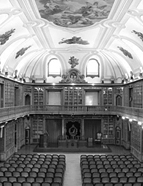

António de Vasconcelos had no taste for political history, although he had attempted it. He was devoted, above all, to certain modalities of the local history of the church and the university institutions of Coimbra, whose continuators, in the period under consideration, were primarily Mário Brandão, but also M. Lopes de Almeida.
However, from the 1930s onwards, political history may be noted in the bibliography of Damião Peres and Lopes de Almeida and, later on, in Salvador Dias Arnaut and even in the initial phase of Luís Ferrand de Almeida (1922-2006), albeit alongside other features. Political, diplomatic, military and institutional history, the latter being fostered by the historians of the Faculty of Law, some of whom also taught at the Faculty of Arts, at a time when the study of societies had not yet been imposed. Moreover, this trend had already been mapped in 1901, at least for the Curso Superior de Letras, and the legislator had decreed that: the study of homeland history «is based, in particular, on the political, diplomatic, colonial history and national institutions». This current was also in line with the majority of research conducted in Portugal from 1928 to 1939, as may be seen in the charismatic História de Portugal [History of Portugal] under the direction of Damião Peres, in seven volumes plus a further two supplements, the first of which, by the literary director, published between 1954 and1958. As has already been calculated, in this work, political history had by far the most pages in relation to the other themes.
The content of this work was of a national nature and stemmed from nationalistic intentions, such as those integrated in the double commemorations of the foundation of nationality and the liberation of Portugal in 1640, an opportunity to exalt the "Portuguese World". But the history that was made and has been made up to current times is national, before the generalisation of transnational and global history. I am convinced that in the period under analysis, no Portuguese mission departed to a foreign country to study its history. The nation's affairs were what had to be studied as a priority. The aim of the Revista Portuguesa de História [Portuguese History Journal](RPH), a body of the Institute of Historical Studies which began publishing in 1940-1941, was to study the nation, as was the Revue Historique for France, which had begun in 1876 and Madrid's Centre of Historical Studies' (1910) programme. Patriotism, wrote Merêa in 1940, is not incompatible with objectivity, when duly understood, and thus he continued to be considered, even in 1962 by Torquato Soares, specialised in research on the origins of Portuguese nationality and municipal institutions.
